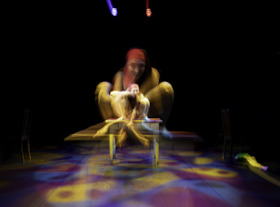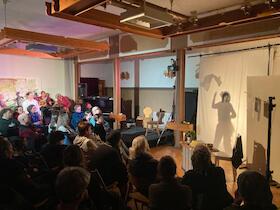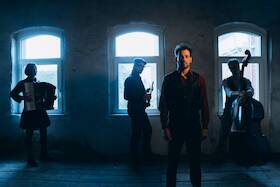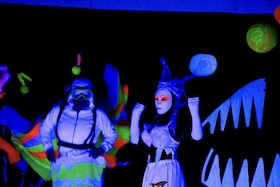EISLER - LOST IN HOLLYWOOD
07.02.2026
um 20:00 Uhr
/ Dresden
Der Mensch und Komponist Hanns Eisler steht im Zentrum der neuen Produktion der Compagnie Freaks und Fremde: rundum widersprüchlich, gewitzt, kämpferisch und voller Sehnsucht - ein entsetzlich kleiner Mann in einer grotesk großen Welt. Auf allen Straßen der Welt werden seine Lieder gesungen, doch in Hollywood gibt es für ihn trotz Oscar-Nominierung kein Happy End. Im Kalten Krieg erstarren seine Träume. Eislers Leben und Werk sind geprägt von den kulturellen Umwälzungen seiner Zeit, von politischem Kampf, von Flucht und Exil und dem eigenen Anspruch, Nützliches zu schaffen, im Ringen um eine Kunst, die Menschen zu erkennen und zu verändern vermag. Aus der Collage ausgewählter Lieder und überraschenden szenischen Elementen, animierten Video-Projektionen und Puppentheater entsteht das Porträt eines außergewöhnlichen Komponisten.
Hanns Eislers Kompositionen sind vielgestaltig, herausfordernd und äußerst lebendig. Er vertonte Gedichte und Zeitungsnotizen, schrieb fürs Theater, Arbeiterchöre und Solisten, für Laien und professionelle Instrumentalensembles. Seine Musik dröhnte aus Kinolautsprechern und schallte auf Straßendemonstrationen. Er füllte Konzertsäle und brachte in Kneipen die Leute zum Lachen.
Zeit seines Lebens beschäftigte er sich in Theorie und Praxis mit Musik und ihrer kulturellen Funktion. Er sah sich selbst als Genie, war aber auch stets ein Zweifler in eigener Sache. Ein Mensch, der Widersprüche liebte und lebte und zu einem der umstrittensten Künstler des 20. Jahrhunderts wurde. Sein Leben und Werk dokumentiert die Geschichte Europas des letzten Jahrhunderts, die sich durch die Gräben des ersten Weltkriegs hinein in Revolutionen, Wirtschaftskrise und Diktaturen des Terrors kämpft und nach der Zerschlagung Nazideutschlands schließlich in den großen ideologischen Fronten des Kalten Krieges erstarrt. Als junger Komponist kritisiert er den etablierten Kunstbetrieb und dessen Aufführungspraxis, befragt die Rolle des Künstlers und der Kunst in der Gesellschaft und fordert nicht weniger als eine Revolutionierung der Musik.
Er will als Künstler »Nützliches« schaffen, stellt individuelle Ambitionen hintan und verbindet seine musikalische Arbeit mit dem Kampf gegen Krieg und soziale Ungerechtigkeit, für eine bessere, friedvollere Welt. Sein geschätzter Lehrer Arnold Schönberg würde ihm dafür am liebsten den Hintern versohlen. Die Arbeiter aber greifen seine - ihre - neue revolutionäre Musik begeistert auf, singen sie weltweit auf den Straßen, später auch in den Schützengräben Spaniens. Den Nationalsozialisten taugen die bekannten Melodien für die eigene Propaganda. Da reicht ein Verweis unter dem neuen Text, den Abdruck der Noten kann man sich sparen. Der Komponist landet auf der schwarzen Liste. Für Hanns Eisler beginnt, wie für zahlreiche seiner Zeitgenossen eine Odyssee. Über viele Stationen und Hindernisse findet er schließlich in den USA einen Ort, an dem er leben und arbeiten kann.
Eisler verankert sich - im Widerspruch zum dem schicksalhaft ‚Geworfen-seins‘ des Exils - verortet sich musikalisch buchstäblich an einem anderen Standpunkt, gießt die alten eigenen kulturellen Wurzeln, gräbt in neuer Erde. Es schreibt gegen die Sinnlosigkeit und die Leere an, notiert Momentaufnahmen von Stimmungen, Erinnerungen und Erfahrungen der Exilanten und Kompositionen für eine unbekannte Zukunft.
Auch die produktive Zusammenarbeit mit dem Dichter und Dramatiker Bertolt Brecht wird hier fortgesetzt. So beschreiben die beiden Künstler in den ‚Hollywood-Elegien‘ die Konfrontation mit dem Phänomen Hollywood, wo hinter den Fassaden der Traumfabriken die Abgründe der ungeschminkten kapitalistischen Filmindustrie im Zentrum der amerikanischen Kultur klaffen.
Mit der Zeit wird in Amerika sein Fachwissen geschätzt, sichern Filmaufträge seinen Lebensunterhalt, werden zwei seiner Filmmusiken sogar für den Oskar nominiert. Bleiben kann er jedoch auch hier nicht. Knapp zwei Jahre nach dem Ende des zweiten Weltkrieges kündigt die wachsende antikommunistischen Paranoia in Amerika den Kalten Krieg an: Er sei der »Karl Marx der Musik« und so wird Hanns Eisler des Landes verwiesen.
Er siedelt sich in der DDR an, wo er eine Professur bekommt, an der Gesamtausgabe seines Werks und mit Brecht arbeiten kann. Während man seine avantgardistischen Werke kaum aufführt und Hanns Eislers Faust in der Hölle formalistischer Kulturpolitik verschmort, wird der Komponist der Nationalhymne himmelhoch oben auf einem Sockel abgestellt.
Das widerspruchsvolle Leben dieses Mannes und seines vielfältigen Werkes ist ein gefundenes Fressen für die Compagnie Freaks und Fremde und ihre kritische Auseinandersetzung mit der Welt. Eisler inspiriert zu einer Suche nach unsentimentaler Poesie, die sich im Spannungsfeld zwischen Text und Ton verbirgt. Im besten Sinne gute Unterhaltung: anregend und vielleicht etwas unbequem.
Künstlerische Leitung, Szenografie, Performance: Sabine Köhler, Heiki Ikkola | Musikalische Leitung, Live-Musik: Frieder Zimmermann | Special Guest: Tobias Herzz Hallbauer | Videoschnitt, Projektionen: Beate Oxenfart | Technische Leitung, Lichtdesign: Josia Werth | Mitarbeit Regie, Dramaturgie: Jörg Lehmann | Kamera, Vorproduktion: Eckart Reichl | Gastmusikerinnen Studioproduktion: Anna Schumann, Anna Zepnick | Sprecher Studioproduktion: Boris Schwiebert
Dauer: ca. 90 Minuten
 Hallo, ich bin Maya.
Hallo, ich bin Maya.





